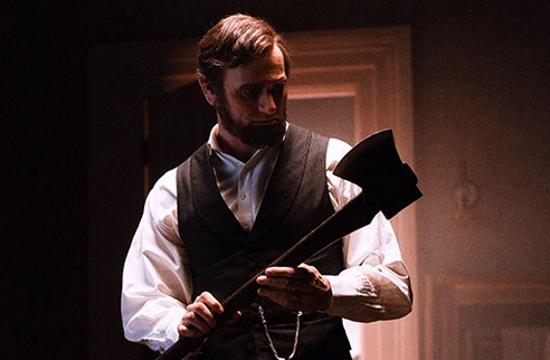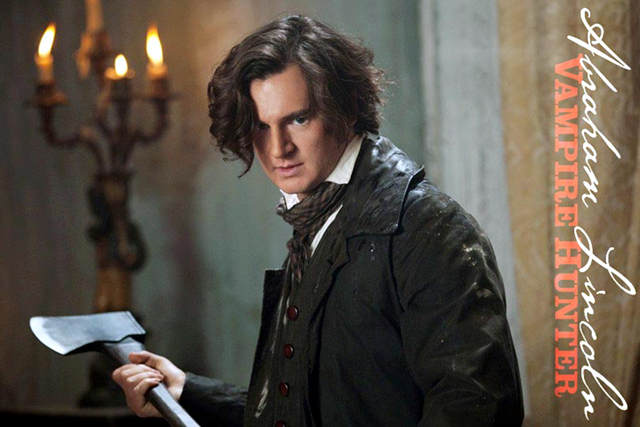Abraham Lincoln: Vampire Hunter (2012)
DIRECTOR: Timur Bekmambetov
CAST:
Benjamin Walker, Dominic Cooper, Mary Elizabeth Winstead, Rufus Sewell, Anthony Mackie, Jimmi Simpson, Erin Wasson, Alan Tudyk, Marton Csokas
REVIEW:
Did you know the Confederacy was allied with vampires during the Civil War, that Abraham Lincoln was a vampire hunter before and during his Presidency, and that it was only his delivery of silver to the battlefield that decided the Union victory at the Battle of Gettysburg? I kid, of course, but all of the above is what Abraham Lincoln: Vampire Hunter, an adaptation of Seth Grahame-Smith’s tongue-in-cheek pseudo-biography, would have you believe. Like the book, it’s a little hard to figure out who the target audience is. Certainly, this is the kind of movie that will give sticklers for historical accuracy a seizure, and for many others, a movie portraying Abraham Lincoln as a vampire slayer is just too “huh?” to draw the big box office crowds. Taken on its own merits, however, it’s fairly, if inconsistently, engaging, and if nothing else, enough of a curiosity to be worth at least a glance on that score alone.
 Abraham Lincoln’s destiny as a vampire hunter (and, by the way, our nation’s 16th President), began on the night his mother was murdered by the vampire Jack Barts (Marton Csokas). As a young man (Benjamin Walker), Abe begins his quest for revenge, but first he gets some valuable lessons and training from Henry Sturgess (Dominic Cooper), a vampire who was turned against his will and now trains vampire hunters. Despite Henry’s warning to form no attachments, Abe falls in love with and eventually marries Mary Todd (Mary Elizabeth Winstead), and gains two other valuable allies: shopkeeper Joshua Speed (Jimmi Simpson) and childhood friend, freed slave Will Johnson (Anthony Mackie). Meanwhile, he learns the full horrifying truth of how deep vampires’ influence in the States runs. The American South is overrun by legions of vampires, led by the ancient Adam (Rufus Sewell), who are using slaves as a food supply and allied with the burgeoning Confederacy to spread their reign to the entire nation. Determining to fight on a broader scale, Abe goes into politics, defeating Mary’s former suitor Stephen Douglas (Alan Tudyk) in slavery debates and, of course, eventually becoming President of the United States. Inevitably, the Civil War breaks out between Lincoln’s Union and the vampire-backed Confederacy, and the conflict will decide once and for all “whether this nation belongs to the living…or the dead”.
Abraham Lincoln’s destiny as a vampire hunter (and, by the way, our nation’s 16th President), began on the night his mother was murdered by the vampire Jack Barts (Marton Csokas). As a young man (Benjamin Walker), Abe begins his quest for revenge, but first he gets some valuable lessons and training from Henry Sturgess (Dominic Cooper), a vampire who was turned against his will and now trains vampire hunters. Despite Henry’s warning to form no attachments, Abe falls in love with and eventually marries Mary Todd (Mary Elizabeth Winstead), and gains two other valuable allies: shopkeeper Joshua Speed (Jimmi Simpson) and childhood friend, freed slave Will Johnson (Anthony Mackie). Meanwhile, he learns the full horrifying truth of how deep vampires’ influence in the States runs. The American South is overrun by legions of vampires, led by the ancient Adam (Rufus Sewell), who are using slaves as a food supply and allied with the burgeoning Confederacy to spread their reign to the entire nation. Determining to fight on a broader scale, Abe goes into politics, defeating Mary’s former suitor Stephen Douglas (Alan Tudyk) in slavery debates and, of course, eventually becoming President of the United States. Inevitably, the Civil War breaks out between Lincoln’s Union and the vampire-backed Confederacy, and the conflict will decide once and for all “whether this nation belongs to the living…or the dead”.
Considering the inherent absurdity of the premise, one might expect (or even hope) for Abraham Lincoln: Vampire Hunter to be a campy riot. Instead, director Timur Bekmambetov (who previously directed the stylized actionfest Wanted) and his cast and crew plays things resolutely straight, or at least as straight as any movie featuring Abraham Lincoln slaying vampires can be. The first two-thirds or so are the strongest. If one ignores the fact that the main character’s name is Abraham Lincoln, it plays like a 19th-century superhero origin story. There is the man, like Batman, Superman, and Spider-Man, who loses family in a childhood tragedy. The mentor figure. The faithful sidekicks. The love interest who doesn’t know his true activities. The megalomaniac villain with a master scheme. The pace whisks right along, with training montages and intense action sequences. Bekmambetov shows the same sense of graphic novel-esque stylized action he brought to Wanted. For a while, I was surprised at how engaged I was.
I wouldn’t go quite so far as to say things fall apart when we abruptly jump ahead to Lincoln’s Presidency and the Civil War, but it’s where things get a little silly (relatively speaking). Part of the problem is, like the book, the movie is a one-joke pony that’s not as witty as it thinks it is, and the gimmick of Abe Lincoln slaying vampires only maintains our curiosity for so long. The second problem is that the movie has less wit than the book by taking the concept over-the-top. Seth Grahame-Smith wrote his book as an actual straight biography covering in historically accurate detail Lincoln’s early life, Presidency, and wartime leadership…and also just happened to weave in his secret battles with the living dead. The vampires and Lincoln’s war with them stayed behind the scenes, leaving historical events like the Civil War to play out–publicly–as they did in reality. Some of the most clever parts of the book were those that interwove historical events with Lincoln’s war on vampires. The film fleetingly scratches the surface of this, with Abe’s Emancipation Proclamation as part of a strategy to rob vampires of their food supply, but mostly dispenses with such satire in favor of a more straightforward action-adventure, losing the book’s cleverness along the way. The movie strips the concept down to Lincoln versus vampires, glossing over the historical accuracy that gave the book its tongue-in-cheek, pseudo-serious wit, and relaying “historical” events in an obviously absurd manner. You don’t have to be an expert on the Civil War to know Mary Todd Lincoln did not win the Battle of Gettysburg by using Harriet Tubman’s Underground Railroad to smuggle silver to the Union troops to destroy the army of Confederate vampires. A couple famous historical figures, including Harriet Tubman (Jacqueline Fleming) and Jefferson Davis (John Rothman) make walk-on appearances, but they, Lincoln’s election, anything to do with his Presidency and the Civil War besides the climactic–and wildly inaccurate–depiction of the Battle of Gettysburg is skimmed straight over. Granted, it’s not like you watch a movie about Lincoln slaying vampires for a history lesson (at least one would certainly hope not), but like the book, the movie also leaves one begging the question: “what was the point?”. It’s frequently entertaining in the moment, but generates a bit of an incredulous shrug in the afterthought.
 Unknown young actor Benjamin Walker, who is much better-looking than the real Lincoln (in fact, he looks like a young Liam Neeson), doesn’t show much range, but he’s suitably tall and stiff-backed, looks sufficiently like President Lincoln when he eventually dons age makeup and the beard, and plays it all with a stoic seriousness (one of the movie’s surprisingly few amusing moments is right before Abe boards the train transporting silver to Gettysburg, where he solemnly intones “80 miles to decide whether this nation belongs to the living…or the dead”). Like Walker, Mary Elizabeth Winstead is far more attractive than the historical Mary Todd. Anthony Mackie and Jimmi Simpson are fine as Abe’s sidekicks. Model Erin Wasson doesn’t say much, but gets to strut around in what looks like leather fetish wear, as Adam’s henchwoman Vadoma. The two best performances are by Dominic Cooper, who is solid as Abe’s mentor Henry, and Rufus Sewell, who is coolly evil as Adam, although his demise is disappointingly ho-hum and anti-climactic (in fact, Marton Csokas’ Jack Barts gets a better exit).
Unknown young actor Benjamin Walker, who is much better-looking than the real Lincoln (in fact, he looks like a young Liam Neeson), doesn’t show much range, but he’s suitably tall and stiff-backed, looks sufficiently like President Lincoln when he eventually dons age makeup and the beard, and plays it all with a stoic seriousness (one of the movie’s surprisingly few amusing moments is right before Abe boards the train transporting silver to Gettysburg, where he solemnly intones “80 miles to decide whether this nation belongs to the living…or the dead”). Like Walker, Mary Elizabeth Winstead is far more attractive than the historical Mary Todd. Anthony Mackie and Jimmi Simpson are fine as Abe’s sidekicks. Model Erin Wasson doesn’t say much, but gets to strut around in what looks like leather fetish wear, as Adam’s henchwoman Vadoma. The two best performances are by Dominic Cooper, who is solid as Abe’s mentor Henry, and Rufus Sewell, who is coolly evil as Adam, although his demise is disappointingly ho-hum and anti-climactic (in fact, Marton Csokas’ Jack Barts gets a better exit).
Abraham Lincoln: Vampire Hunter is less than the sum of its parts, but some of those parts are noteworthy. A scene at Adam’s plantation, where he and his undead cohorts throw a ball and then feed on their human “guests” is suitably creepy, as is the following battle between Abe and Adam’s minions. The showdown between Abe and his mother’s murderer Jack Barts is even better, with the two leaping across the backs of stampeding horses. And the movie suitably saves its largest and most elaborate action setpiece for last, with a battle on a train racing to Gettysburg that ends with a burning bridge and the train plunging to its destruction in spectacular fiery fashion. Those who despise Twilight‘s “vampires” will be pleased to know that these bloodsuckers, while they have “adapted” to sunlight (although they wear sunglasses and sun-blocking skin cream) in a throwaway line that I was curious to know more about and never do, are vicious, fanged, bloodthirsty monsters, with Adam on hand for those who prefer their vamps with a touch of culture. Caleb Deschanel’s cinematography captures a few pretty pictures (one of the most striking shots is the first one, with Washington DC time-morphing from the present back to the 1860s). The movie zips along at a brisk pace, with its 1 hour 35-minute runtime passing quickly, and I never got bored while viewing. In fact, it could have used another half hour or so to flesh out some aspects, especially the war and Lincoln’s Presidency, which is relegated to the final twenty minutes or so after the “superhero origin story” esque first hour. This also robs us of more of the deliciously surreal images promised by the title of Abraham Lincoln as we picture him, in full beard and top hat, swinging an ax and lopping off vampires’ heads left and right, which doesn’t come until the climactic train fight.
Abraham Lincoln: Vampire Hunter plays like a graphic novel, condensing a lot of history and unconcerned with either historical accuracy or the passage of time. There are some standout action sequences, and the movie, taken in and of itself, is always at least moderately entertaining. But it never escapes the “so, what was the point?” feeling that the book left, something Bekmambetov is unable to overcome with a suped-up emphasis on action and head-chopping. The movie is technically well-made, but counts too much on its unique concept to give it enough of a curiosity factor to draw people in. At the bottom line, a movie about Abe Lincoln slaying vampires never escapes feeling just too pointlessly weird, even if it’s probably made about as well as such a movie is ever likely to be.
**1/2